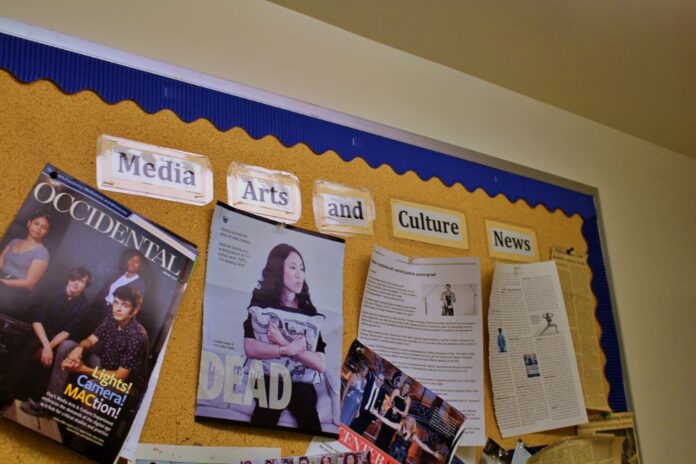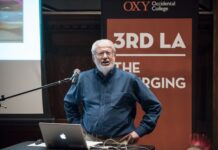
Amid growing anticipation of an industry-wide strike by the International Alliance of Theatrical Stage Employees (IATSE), the tenured professors of the Media Arts & Culture (MAC) department sent an email to the college community voicing its support for the union Oct. 16. Since the MAC department sent their email, IATSE has reached a tentative agreement with Hollywood’s major studios, effectively calling off the strike.
“The [MAC] Department at Occidental College stands in solidarity with IATSE and film/TV/media workers everywhere who are fighting for safe working conditions and a fair contract,” the MAC department said in their email. “Should IATSE choose to strike, we unequivocally voice our support and urge everyone to honor the picket lines.”
IATSE is a national union of over 150,000 members composed of film industry operators, specialists, builders, coordinators, editors and more. According to Variety, a strike by IATSE members could result in a nationwide shutdown of TV and film production, forcing major studios to reevaluate the terms of IATSE’s demands.
According to the L.A. Times, a number of IATSE members are unhappy with the scope of the tentative agreement’s outcomes. If the majority of union members vote to reject the deal, a strike may still actualize.
The possibility of a strike is the result of a scheduled contract negotiation that occurs every three years, and IATSE negotiators advocating for rest on weekends, pay increases, federal holiday time off and more.
According to MAC professor Aleem Hossain, the faculty of MAC strongly believe in the demands that the IATSE is asking for.
“We want to imagine what the industry could be,” Hossain said. “We had this moment where we agreed that we all personally support [the IATSE demands] and we should make that public, especially as we’re heading into this sort of critical moment.”
Beyond that, Hossain said the email was also educational for students, faculty and staff who have not had exposure to the issue.
Sarah Cook (sophomore) who is considering a career in the film industry, said she was grateful that the MAC department both shared the information and took a stance in support of entertainment workers.
“It’s important that we address these kinds of issues because a lot of students are coming into the [media] workforce very idealistically,” Cook said. “We have a lot of ideas about how we don’t care how much we’re exploited because we just want to get into the industry.”
Peter Dreier, professor in both the politics and Urban & Environmental Policy (UEP) departments at Occidental and board member of the Los Angeles Alliance for a New Economy (LAANE), a coalition of unions, environmental, community and faith groups, said that its good for students to see the other side of the entertainment industry.
“It’s great for Oxy faculty and students to have their consciousness and awareness raised about what’s happening outside the Oxy bubble,” Dreier said.
According to Dreier, since the beginning of the pandemic there has been a rise in worker labor reevaluation. This is exemplified by a phenomenon called “Striketober,” a colloquial term to describe the wave of strikes that have gained traction this October, including strikes by employees at Kellogg’s, Nabisco, John Deere and more.
According to the email from MAC faculty, the prevalence of harsh working conditions in the film industry are considered an “open secret.” According to Drier, the IATSE strike draws attention to a pattern of labor exploitation in the film industry including gender pay inequity, insufficient wages and physical abuse.
Hossain said that the long work hours in film and TV industries are inaccessible, exclusionary and favor young white men, who are less likely to have responsibilities such as taking care of children or elderly relatives. Hossain said improving work conditions will help improve diversity on film sets.
According to Cook, the realities of working conditions in the film industry have not been explicitly addressed in the classes she has taken so far in the MAC department, and there has not been room for such discussions in her current class curriculum.
While there is no labor studies department at Occidental, certain classes touch on elements of the labor movement, according to Dreier.
“I feel committed to addressing [the reality of working conditions] more explicitly in the classroom,” Hossain said. “I’ve been teaching the safe practices and why I think they’re good, but I have not really dug into how they are part of a broader labor struggle, and I now feel inspired to speak more about that.”
According to Dreier, the process of approving IATSE labor contracts is very democratic. The union leaders and their staff who negotiate the deal were elected by the union members, and ultimately the members have to approve it, Dreier said.
Cook said the tentative agreement between IATSE and Hollywood’s major studios is proof of the power of labor organizing.
Dreier said students who wish to support IATSE and other unions can show up to picket lines and rallies, stay informed and organize teach-ins, engage in internships with unions and support union groups on social media.
“When you’re in a hierarchy and you’re at the bottom, that doesn’t mean that you have somehow surrendered your basic human rights,” Hossain said. “You can feel entitled to assert those rights. There is fear that doing so will ruin your whole career in Hollywood. The more people [assert those rights], the less that can be true. And quite frankly, if that were true, then we just wouldn’t want to work at all.”
![]()



































